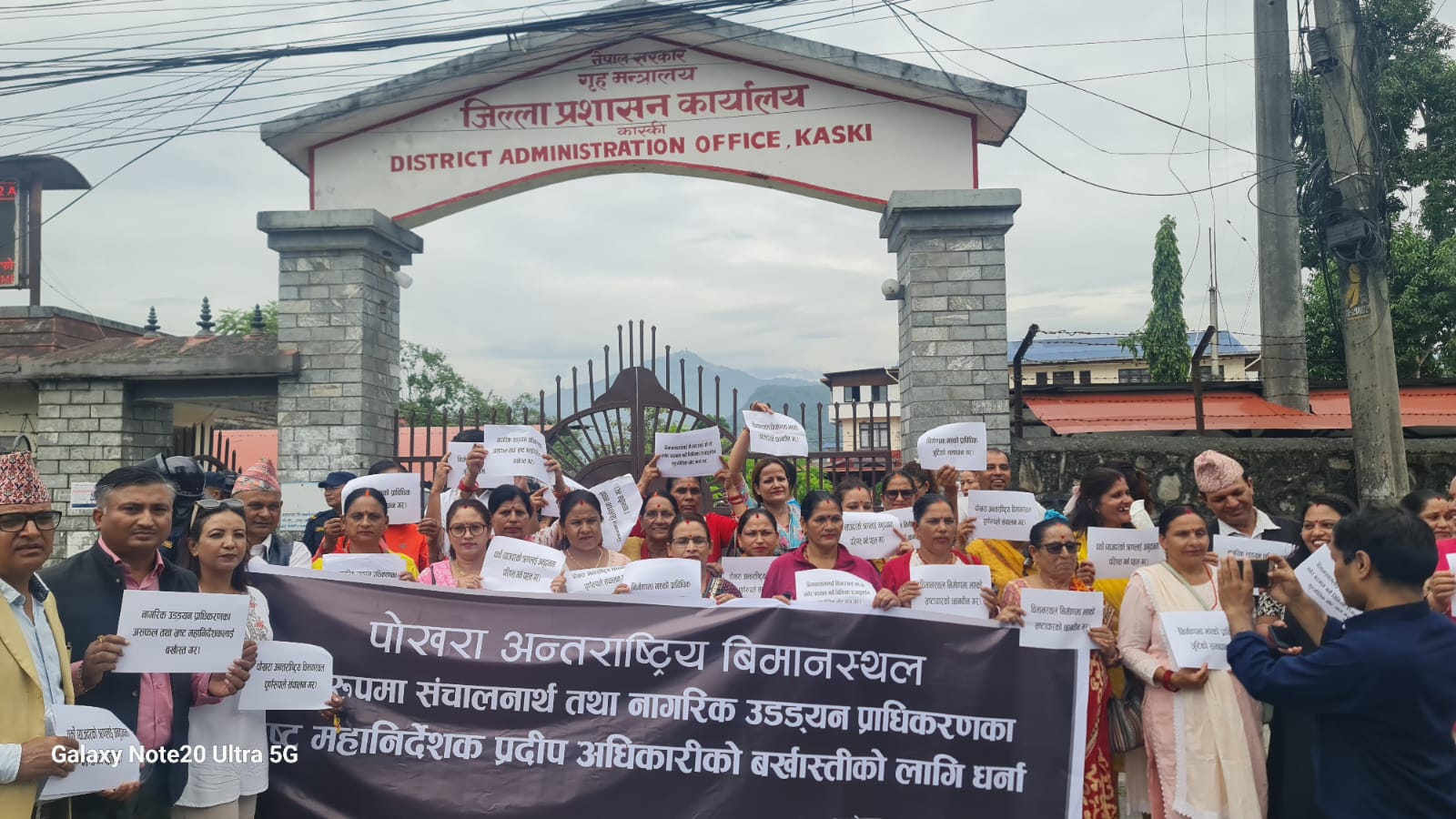Nationwide Uprising: Massive Protests Erupt in Nepal Against Chinese Debt Trap and Corruption!

A recent protest in Pokhara against corruption has raised serious concerns about Nepal's economic future. The Rastriya Ekata Abhiyan (National Unity Campaign) led the protest outside the Kaski District Administration Office, where over 150 participants voiced their discontent over corruption in the construction of Pokhara International Airport and the alleged failure of Civil Aviation Authority Director General Pradeep Adhikari. The protestors highlighted the growing fears of a Chinese debt trap, warning that Nepal may be falling into a carefully crafted economic trap set by China.
A Chinese Debt Trap: A Deliberate Conspiracy?
Nepal has been burdened by a $216 million loan from China under the Belt and Road Initiative (BRI) to construct Pokhara International Airport. However, the airport, which was meant to be a major hub for boosting tourism and economic growth, has failed to deliver on its promises. The debt repayment has now become a heavy burden for Nepal, pushing the country toward financial instability.
The construction of Pokhara International Airport has been marred by technical flaws, mismanagement, and corruption, raising questions about the role of Nepali officials and Chinese contractors. Locals have voiced their dissatisfaction, calling for an investigation into the project’s irregularities and demanding accountability from those responsible for the mismanagement. In particular, they have pointed fingers at Civil Aviation Authority Director General Pradeep Adhikari, demanding his resignation amid corruption accusations.
Protest Against Chinese Debt and Corruption
The protest organized by the Rastriya Ekata Abhiyan in Pokhara's Sahid Chowk saw demonstrators holding placards that read, “Fully Operate Pokhara International Airport,” “Investigate Corruption in Airport Construction,” and “Fire Pradeep Adhikari for Corruption.” The dissatisfaction stems not only from the airport’s poor performance but also from the high-interest loans used for its construction, which many feel is a financial trap set by China.
Citizens of Pokhara expressed their frustration, demanding that the government take immediate steps to rectify the issues and ensure that the airport is fully operational. They also called on the government to negotiate with China for more favorable loan terms, including the possibility of turning the debt into grants.
Chinese Media's Disrespectful Remarks About Nepal
Nepal's recent request for debt relief on the Pokhara International Airport loan has sparked outrage in Chinese digital media. Articles published in major Chinese outlets, such as Sina.cn, criticized Nepal's appeal for debt forgiveness, accusing the country of trying to escape its financial obligations. A scathing article remarked, "Does Nepal think we are fools?" expressing China’s frustration over Nepal’s apparent reluctance to repay the loan.
Another report on QQ.com highlighted the weak performance of Pokhara International Airport, calling Nepal’s request for debt forgiveness irresponsible. The article pointed out that the airport has failed to attract the expected level of international traffic, and instead of delivering results, Nepal is now seeking a way out of its financial commitments. This has further strained relations between the two countries and added to the negative perception of Nepal in Chinese media.
Chinese Debt’s Impact: A Diplomatic Crisis for Nepal
The heavy burden of Chinese debt is pushing Nepal into a deeper economic crisis. The $216 million loan for Pokhara International Airport has put Nepal at risk of falling into a debt trap, making it increasingly dependent on China. Moreover, the critical tone in Chinese media has not only damaged Nepal’s international reputation but also raised concerns about the long-term viability of its relationship with China.
The issue is not just economic but also geopolitical, as Chinese commentators have accused Nepal of leveraging its strategic position between China and India to gain financial advantages. They argue that Nepal’s government is trying to maintain close ties with China while simultaneously avoiding its financial responsibilities.
Ongoing Protests by the Rastriya Ekata Abhiyan
The Rastriya Ekata Abhiyan has been protesting against what it sees as China's efforts to trap Nepal in unsustainable debt. Their protests have focused on the corrupt practices surrounding the construction of Pokhara International Airport, as well as the broader implications of Chinese loans on Nepal’s economy. Protesters have repeatedly demanded transparency in how the airport project was handled, calling for an investigation into the corruption that they believe has tainted the project.
Additionally, the protestors have called for the resignation of Pradeep Adhikari, the Civil Aviation Authority’s Director General, whom they accuse of corruption and gross mismanagement in handling the airport’s construction and operations. The National Unity Campaign has made it clear that their fight is not just against local corruption but also against foreign influence that threatens Nepal’s sovereignty.
Conclusion: Chinese Debt is Driving Nepal Toward Economic Crisis
The debt Nepal owes to China for the construction of Pokhara International Airport has become a growing concern. The project, once hailed as a significant milestone in Nepal’s development, has now become a symbol of the country's increasing economic troubles. Corruption within Nepal and the rising influence of China’s financial leverage have left the country vulnerable to a debt trap that could have long-term consequences.
The disrespectful tone of Chinese media, coupled with the dissatisfaction expressed by Nepali citizens, has strained the diplomatic ties between the two nations. The ongoing protests led by the Rastriya Ekata Abhiyan highlight the growing unrest among the Nepali people, who are demanding both internal reform and a reassessment of Nepal’s relationship with China.
The government now faces the critical task of addressing the corruption that has plagued the airport project while simultaneously negotiating with China to find a way out of the financial quagmire. Failure to act could lead to further economic instability and deepen Nepal’s reliance on foreign powers, jeopardizing the country’s long-term sovereignty and economic independence.




![From Kathmandu to the World: How Excel Students Are Winning Big [Admission Open]](https://nepalaaja.com/img/70194/medium/excel-college-info-eng-nep-2342.jpg)
